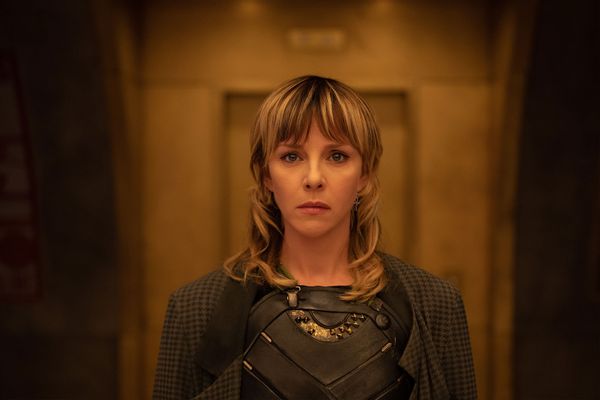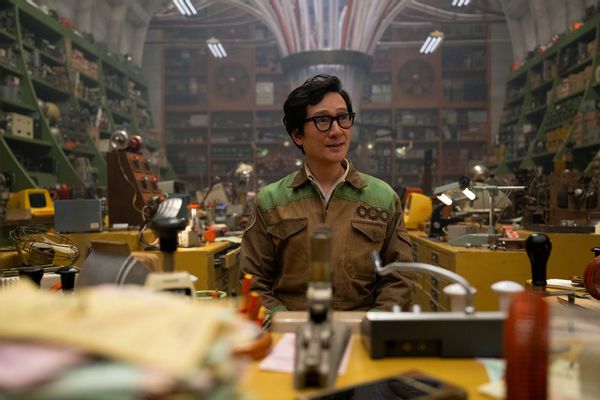It’s impossible to tell where in the multiverse “Loki” is going. Thank the gods
Between the first season of “Loki” and its second, the Marvel Cinematic Universe‘s stranglehold on our cultural conversations took a nosedive. Its films still made more than the gross domestic product per capita of several countries, but less than previous chapters, with a few exceptions – primarily those involving Peter Parker. Appraisals from critics and fans have been less enthusiastic.
As for the TV spinoffs that came and went between the summer of 2021 and now, aside from “Ms. Marvel,” most demonstrated the law of diminishing returns in action with its Nick Fury-fronted “Secret Invasion” feeling entirely inessential.
What about the latest season of “Loki”? Two episodes into the four-hour sample Marvel provided to critics left me feeling unmoored, unsure of where Tom Hiddleston’s trickster and his soulmate variant Sylvie (Sophia Di Martino) were going or why Owen Wilson’s Mobius lacked the singular focus that drove him in previous episodes.
Frequently I had to pause and rewind so I could reassemble the first season puzzle with the second’s new pieces changing everything. Devouring two more episodes left me no closer to knowing what was happening or where the season would land.
Fantastic.
The creatively delirious second season of “Loki” may not be an intentional response to the MCU’s distending monotony, but it certainly feels like its new head writer Eric Martin, inheriting the reins from Michael Waldron, wants to shatter expectations.
Devouring four episodes left me no closer to knowing where the season would land. Fantastic.
Where the first season was met with a few groans about the series trying to be “Doctor Who,” these new episodes embrace that implication by tossing its players into a few period-specific away missions. Those don’t seem too far out of the ordinary from life at TVA HQ, where all of the devices resemble obsolete technology from the 1960s and ’70s while pulling off futuristic feats. Like, say, making portals to different existences materialize from nothing or cranking out identical slices of key lime pie for no fathomable reason.
If the two remaining episodes end everything in a jumble of wire and ribbons, we can’t say that opening each package that brought us to that point wasn’t a fun time. For once, or maybe the first time since the MCU entered this arena, we have a season of TV that doesn’t feel overtly beholden to bridging other stories.
It is, same as the first season. Jonathan Majors‘ He Who Remains has as many variants as Loki Laufeyson, the most consequential of whom pops up in “Ant-Man and the Wasp: Quantumania” movie as Kang the Conqueror, the next MCU phase’s Thanos equivalent. (Apparently Majors’ participation in Season 2 was unaffected by his March arrest on assault, strangulation and harassment charges related to attacking a former girlfriend. His trial was delayed three times, with its start now set for Oct. 25, one day before the fourth episode premieres.)
But since this “Loki” variant is fortifying its identity as a serialized story, it may not matter whether the latest incarnation of the villain meets up with his big-screen self. Frankly, it would be great if that character and everyone and everything else about this plot were left to their own devices, securing the separation between it and the MCU’s theatrical identity. It may end up leaving us entirely discombobulated, but so far, it’s a good mess.
For the audience, that is. At the Time Variance Authority, reality is imploding. Picking up where the events of the season finale left off, the so-called sacred timeline is branching out of control, a factor pushing the TVA’s core stabilizing mechanism beyond its capacity. Terrible timing, since right before that happens, all TVA agents find out the organization to which they’ve devoted their lives is a lie.
 Sophia Di Martino as Sylvie in “Loki” (Gareth Gatrell/Marvel)
Sophia Di Martino as Sylvie in “Loki” (Gareth Gatrell/Marvel)
Some of them choose to stay the course, figuring that remaining ignorant of their other lives’ details is bliss. Others grow curious and go AWOL. These concerns aren’t as pressing as what’s happening to Loki, who is torn between the past and the present, a phenomenon called timeslipping, after Sylvie killed He Who Remains.
She’s gone missing, but so has authoritarian TVA judge Ravonna Renslayer (Gugu Mbatha-Raw) – as is the TVA’s A.I. administrative assistant Miss Minutes (voiced by Tara Strong), the cartoon clock that was an agent of He Who Remains all along.
Little of that matters upon our reentry to “Loki,” although viewers who rewatch the Season 1 finale will have an easier time grasping the various threads fraying before everyone’s eyes.
The reality-shifting implications of what Sylvie has done matter less than what’s happening to Loki, who tears apart and reassembles before our eyes, inspiring Hiddleston to toss his mane in signature Loki fashion each time he reconstitutes. (The actor’s chiropractor must have a lot to say about the condition of his neck.)
That disturbing, effects-driven shock to the system is one of many unsettling aspects of a thematically grimmer season that nevertheless maintains its gusto and sense of humor.
Some is attributable to Ke Huy Quan‘s onboarding as O.B., the TVA’s hidden tech genius, and our reminder that not everything that happened to the multiverse between 2021 and now was terrible. The “Loki” ensemble’s incredible chemistry allows the show to percolate through scenarios that would fall on their face otherwise, and Quan’s eternally curious, upbeat genius fits right in.
 Ke Huy Quan as O.B. in “Loki” (Gareth Gatrell/Marvel)
Ke Huy Quan as O.B. in “Loki” (Gareth Gatrell/Marvel)
Where the first season was an examination of predestination, these new episodes play with determinism.
Heavier dramatic lifting is left to Wunmi Mosaku‘s Hunter B-15 who, like Mobius and Loki, sides with humanity over a bureaucratic logic that favors order over all else, including humanity. But that also leaves Mosaku with the burden of evoking the abject horror her companions would consider a luxury, especially the one who is still a god.
Despite the tremendous stakes, none of the new episodes slog through the extensive complications introduced because the themes are very simple. Where the first season was an examination of predestination and an identity reset for its namesake hero, these new episodes play with determinism – the theory that all our actions are inevitable.
Mainly that examination plays out through Victor Timely, an incarnation of Majors’ god that we haven’t met before.
Want a daily wrap-up of all the news and commentary Salon has to offer? Subscribe to our morning newsletter, Crash Course.
“I promise you this will make sense,” Loki reassures Sylvie at a moment when the universe is falling apart yet again. But he could be talking directly to the audience, which may be as befuddled by everything they’re witnessing as they are entertained, which makes its spiraling plots bearable. We’d rather put up with its attempts at braininess instead of rolling our eyes at another series solving problems with fists and explosions. Granted, “Loki” has its share of battle choreography and magical solutions. But this show doesn’t punch its way through problems half as much as other shows do, choosing to gamble that its viewers prefer more intellectual solutions.
Saying this about a Marvel series more than two years after this show’s first season, and following the many large and small screen franchise misfires, would have seemed unlikely a short time ago, given how energetically moribund the MCU feels.
“Loki” and “WandaVision” enticed us with a new standard of creativity, broadening our concept of what cinematic adaptations of comic book stories could achieve. But the continuation of Wanda Maximoff’s story in a theatrical feature squandered the goodwill her TV narrative built with the audience.
“Loki” avoids that trap in its second season, likely by design – its first ended with a message that the character would return in another season of his show, a tale that contradicts other title’s expectations by being about much more than him. Hiddleston’s trickster resented that fact in Season 1, and watching him battle his selfishness was both entertaining and moving.
Now that he has embraced his relative powerlessness in the larger scheme of the multiverse, we can’t predict what will happen next. It’s about time.
“Loki” returns for its second season on Thursday, Oct. 5 at 9 p.m. ET/6 p.m. PT on Disney+.
Read more
about the MCU

